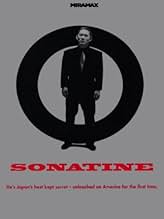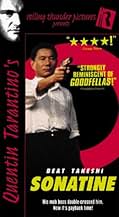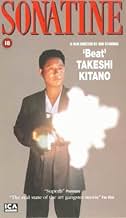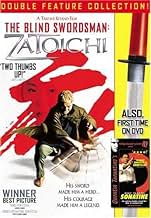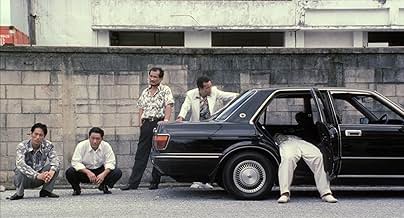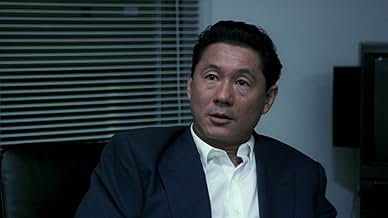Vários yakuzas de Tóquio são enviados a Okinawa para ajudar a acabar com uma guerra entre gangues. A guerra se intensifica e os vagabundos de Tóquio decidem se esconder na praia.Vários yakuzas de Tóquio são enviados a Okinawa para ajudar a acabar com uma guerra entre gangues. A guerra se intensifica e os vagabundos de Tóquio decidem se esconder na praia.Vários yakuzas de Tóquio são enviados a Okinawa para ajudar a acabar com uma guerra entre gangues. A guerra se intensifica e os vagabundos de Tóquio decidem se esconder na praia.
- Prêmios
- 4 vitórias e 1 indicação no total
Avaliações em destaque
I love how the only emotions Murakawa expresses are humor and nihilist apathy. The "sumo scene" is so delightfully out-of-place, while the ending simply leaves your mouth open. The warmth the characters show just makes it more hurtful when they meet such pathetic, low-key ends. I'm not an expert on Japanese society, but I see this film as a comment on the emptiness of a fear-filled culture of reservation, where it is more important to show restraint and respect than it is to continue living.
I'll still enjoy good ol' HK pistol operas, but I'll never see them quite the same again.
It begins with very unsentimentalized and nonglorified violence. People hit and kill each other and it isn't much different than toast popping out of the toaster. It is fast, moderately bloody, and there. Kitano doesn't seem to be interested in thrilling us with either the danger, grotesqueness, or thrill of violence--another, not clearly defined agenda is at work here.
At perhaps a third of the way into the film, it makes a sudden transition from this gangster life to a period of forced inactivity. I suspect this section, which is delightfully playful, is at the heart of this film.
In that sense, the internet-famous cover photo of writer/star/director Takeshi Kitano grinning broadly while holding a gun to his head is a precise depiction of the film's themes. These gangland thugs might be all business when they're intimidating store owners or trading bullets with a rival gang (nary an eyelash is batted when Kitano and company dunk a victim for too long and accidentally drown him), but on their down time, they need to cut loose, have a few laughs and make human connections, too. The really interesting points are where those two opposite modes meet, a jolting transformation when light amusement slams into stone-serious reality and all the easy smiles melt. There's always a momentary hesitation where we can't be certain which way the scales will tip, and that's dangerously exciting. Those key moments take time to develop, though, which leads the plot to really sag in the middle.
Kitano performs very well as the central figure, a stark dichotomy of incompatible moods, but he can't be on-screen at all times and isn't always surrounded by the best supporting talent. A strong thematic concept, one which evidently developed live in the field as the script was extremely bare bones, but not especially well-executed. Loaded with promising ideas, much of Sonatine's ephemeral potential depends upon what you, the viewer, are willing to bring to the table.
Você sabia?
- CuriosidadesThe title Sonatine comes from the musical term sonatina. Kitano said that when learning the piano, when the learner gets to sonatinas they have to decide where they want to go, whether it is to classical, jazz or popular music; marking the point of crucial decision making. This refers to the character Murakawa in the film.
- Citações
Miyuki: You're tough. I love tough guys.
Aniki Murakawa: I wouldn't carry a gun if I were tough.
Miyuki: You can shoot without a second thought.
Aniki Murakawa: I shoot fast because I get scared fast.
Miyuki: But you're not afraid of dying, are you?
Aniki Murakawa: When you're scared all the time, you reach a point when you wish you were dead.
- Cenas durante ou pós-créditosAt the end of the closing credits, various shots of the beach that were taken a year or so later, are included.
- ConexõesFeatured in Century of Cinema: Nihon eiga no hyaku nen (1995)
Principais escolhas
- How long is Sonatine?Fornecido pela Alexa
Detalhes
Bilheteria
- Faturamento bruto nos EUA e Canadá
- US$ 58.834
- Fim de semana de estreia nos EUA e Canadá
- US$ 17.527
- 12 de abr. de 1998
- Faturamento bruto mundial
- US$ 58.834
Contribua para esta página



